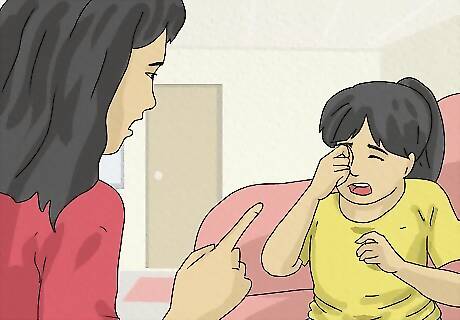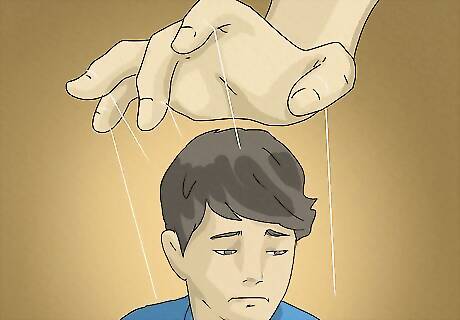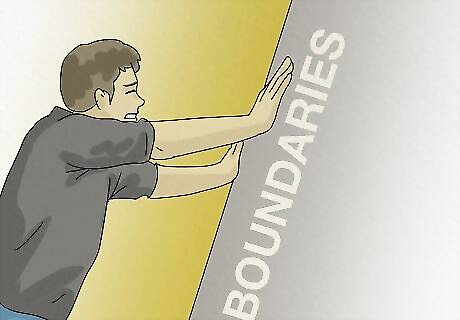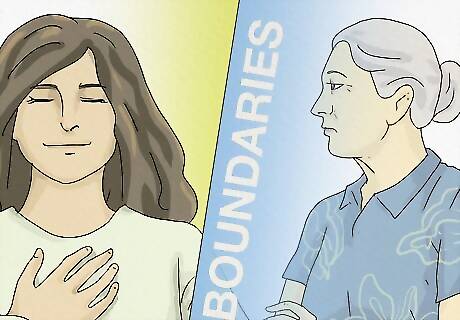
views
Signs of Narcissistic Parents

They give you conditional love. Conditional love means a parent only gives you attention and acts supportive when you do something “right” in their eyes. If you won a competition or earned high honors in school, your parents would be really proud of you and shower you with praise. However, if you fail to reach the expectations a narcissistic parent sets for you, then they’ll act disappointed and be upset with you. If you ace a test, your parents may act really proud of you, but if you get a B or C, they may tell you that you didn’t do good enough and that they expected better from you.

They prioritize their needs over yours. Narcissistic parents have a hard time recognizing what other people need since they have difficulty showing empathy. They may ignore or belittle you when you try to express yourself so they can focus on their own feelings. They may not even realize how their actions affect you or the other people around them. If you’re crying and want a parent to comfort you, they might say that you’re distracting them from an important task you’re doing.

They make themselves the center of attention. A common narcissistic trait is wanting to feel like the most important person in the room, so a parent may try to make everyone focus on them. If they see you or someone else getting attention from other people, they’ll get jealous and cut in to put the spotlight back on themselves. They may turn their attention to someone else, but only if they feel like they could benefit in some way from it. When you’re telling a story, a narcissistic parent may interrupt and start talking about their perspective to take the attention away from you.

They obsess with how they appear to others. Narcissistic parents have a fixation that they’re extraordinary, so they’ll do whatever they can to feel like they’re better than others. They worry about how people will perceive them, so they may spend a lot of time focusing on their looks, style, and status so they seem perfect to everyone else. Narcissists may also feel like they’re entitled to special treatment since ordinary people won’t understand them. A narcissistic parent may buy the latest clothes and brag about how expensive they are in an attempt to impress their friends.

They expect praise for the nice things they do. Narcissistic parents may act nice and appear generous to other people, but it’s usually so they get recognition for it. They want to seem like the perfect parent, so they’ll be vocal about the sacrifices that they’ve made and the hard work they’ve done in hopes that someone will admire them for it. If they don’t get the praise they’re expecting, a narcissist can get really upset. If you got help solving a problem, things a narcissistic parent says could be, “Wasn’t it so nice of me to figure that out for you?” or “Aren’t you thankful that I was here to help you out?”

They get upset when things don’t go their way. Narcissists have high expectations for how things are supposed to go, and even a small deviation can set them off. Because a narcissistic parent wants to feel like they’re in control, they get touchy when you act differently and won’t be flexible with any changes that happen. If you make a mistake that disrupts your parent’s schedule, they might get angry at you for ruining their whole day.

They don’t have empathy for other people. Narcissists are focused primarily on themselves, so it’s tough for them to put themselves in other people’s shoes. They may act disrespectfully because they lack compassion or aren’t worried about your feelings. As long as the narcissist feels good about themselves, they may not recognize problems or issues anyone else is having. When you’re talking with narcissistic parents, they may not listen or engage with what you’re talking about and only bring up their issues when it’s their turn in the conversation.

They don’t let you state your feelings. Narcissistic parents care mostly about their own thoughts and feelings, so they won’t recognize when you’re trying to tell them you’re upset or unhappy. They may sweep your feelings under the rug and say that you’re fine, or they may get angry if they think you’re blaming them for your emotions. If you tell a narcissistic parent that you’re upset by a comment they made, they may say something like, “I’m just joking, don’t be so sensitive,” or “There’s no reason for you to feel like that.”

They get defensive about criticism. Narcissists feel like they’re entitled to special treatment and they’re right in every argument, so challenging those beliefs can really set them off. They may react negatively if you point out minor things they’ve done wrong or criticize their behavior because they’re worried that it will affect how they appear to other people. When you tell a narcissistic parent that they made a mistake, they could lash out by saying that you’re starting an argument and try to justify their reasoning.

They act possessively over you. Narcissistic parents may push you into activities or behaviors that they want rather than taking your wants into consideration. They’re worried that you won’t need them if you act independently, so they may prevent you from forming your own perspectives or beliefs. A narcissist may even try isolating you from other people and activities that they don’t like so they feel like they’re in control. If you want to start dating someone but a narcissistic parent doesn’t like the person, they might say that the person isn’t right for you and you’re not allowed to see them.

They base their reputation on how you act. One way to identify a narcissist is they’ll worry about how other people will see them if you do something wrong. They want to have the appearance of a perfect family and will brag about any accomplishments that you make. If you do something wrong or embarrassing, then your parent will feel like their reputation is tarnished and get upset with you for it. If you get in trouble at school, a narcissistic parent may say something like, “Now what will the other parents think of me?” or “I can’t believe you embarrassed us like that.”

They try to one-up your accomplishments. Some narcissistic parents feel competitive with their children because they’re worried about being overshadowed. Even if you did accomplish something that your parents would be proud of, they may try to take credit for your hard work so it reflects better on them. If you won a competition, a narcissistic parent may take credit by saying, “They wouldn’t have been able to win if I wasn’t such a good teacher.”

They make passive-aggressive comments about you. If a narcissistic parent wants a subtle way to assert control over you, they may make backhanded comments that make you doubt yourself. They may disguise their comments as concerns or continue to nitpick even if you’ve tried compromising with them. When they bring you down with negative comments, they get a boost to their ego while you appear more overwhelmed. When you’re trying on new clothes that a narcissistic parent doesn’t like, they might say something like, “You think that looks good on you?” or, “It’s not something I would ever wear.”

They shift blame away from themselves. Narcissists don’t want to feel like they’re accountable for their actions or emotions, so they may blame you for them. Because the narcissist wants to look their best, they’re worried doing anything wrong will make other people judge them negatively. If a narcissistic parent has an outburst, they may say it’s your fault for provoking them with something you did or said.

They manipulate or gaslight you. When a narcissist wants something to go their way, they’ll try to guilt or convince you to behave how they want. They may make you feel ashamed or they may make negative comparisons so you’re pressured into a choice that you didn’t want to make. They may even play the victim to make you seem like you’re the one acting poorly. A narcissistic parent may say something like, “You’re so ungrateful for all that I do for you,” “You’re not good enough unless you meet my expectations,” or “Why can’t you be a good person like your brother?”
Effects of Being Raised by a Narcissist

You watch what you say to avoid confrontation. Because you were met with such negativity whenever you voiced your opinions, you may be afraid to speak your mind. You may continually worry about provoking other people, which could make you less spontaneous or assertive when you interact with them.

You have a hard time voicing your feelings or needs. Narcissistic parents don’t take your feelings into account, so it becomes difficult to name or trust your emotions as you grow up. If you were worried about what your parents wanted and how they would react, you may neglect how you’re actually feeling and question if you’re doing things because you want to do them.

You develop people-pleasing tendencies. If you spent a lot of time growing up doing everything to keep your parents happy, then you may continue trying to please everyone else in your life. When you’ve become so good at anticipating what will make your parents happy, you get preoccupied doing things for other people to prevent them from getting upset, even if they’re detrimental to you personally.

You have feelings of not being good enough. Because narcissistic parents put a lot of pressure on you to be the best, you may develop a fear of falling short of their expectations. The insecurities and self-doubt from your parents may prevent you from doing new activities that are potentially embarrassing, or may make you turn to self-destructive behaviors as an attempt to cope.

You have trouble setting boundaries. If you tried setting a boundary with your parents as a kid and they got upset, you may think that any boundary you make will receive a negative reaction. You may have trouble handling conflict or standing up for yourself because doing it as a child resulted in a strong emotional reaction or punishment.

You don’t have a good sense of self. If you were raised by narcissists, they may not let you be independent, so you have trouble understanding who you are and what really makes you unique. You may hold onto beliefs or behaviors only because they’re what your parents wanted from you.

You have an anxious attachment style. If you have an anxious attachment style, you crave intimacy and closeness but have a lot of insecurity. You may fear that your partner will abandon you, which could make you too dependent on them and push them away even further. You may also be emotionally distant and avoid conflict so you don’t cause trouble in the relationship.

You may repeat their narcissistic patterns. Since people tend to repeat similar patterns from when they were raised, you may notice you’re acting the same way your parents did. Even if you don’t realize you’re doing it, other people may recognize or point out the narcissistic behaviors you have. If you’re not confident in your own emotional needs, then you may put the same pressure you received onto your own children as well.

You may gravitate toward toxic relationships. If you’re raised by narcissists, being in a relationship with someone who loves you consistently may be unfamiliar and make you feel anxious. Instead, you may look for partners that are more emotionally unavailable or critical of you because it’s what you’re used to dealing with. You may focus on trying to keep your partner happy even if it means you’re giving up things that you want or need.
Healing from Narcissistic Parents

Set healthy boundaries with your parents. When you’re setting your boundaries, take a moment to think about what behavior is acceptable and what you’ll no longer tolerate. When you talk to your parents, tell them your boundaries clearly and firmly. Set consequences for what happens if your parents break your boundary, and be sure to follow through with them. Example: If you want a narcissistic parent to stop shifting blame onto you, you may say something like, “I don’t like when you say something is my fault when I don’t have control over the situation, so I will step away from the conversation if that happens.” Enforce your boundaries every time they’re broken because a narcissist may continue negative behaviors if you don’t react to them. Avoid trying to negotiate your boundaries since a narcissistic parent could try making you feel guilty about setting them.

Focus on your own self-care. Rather than worrying about pleasing your parents, take time to do things that make you happy and fulfilled. Journal about how you’re feeling and share how you’re feeling with friends and other supportive family members. Try to define your personal values and what you want to do with your life, and start working towards positive changes that can point you in that direction. Try doing yoga or practicing mindful meditation to feel more in tune with yourself.

Remind yourself you’re not responsible for your parents’ feelings. Remember that you have the power to control your life choices and how you react to them, but you can’t control how your parents will respond. Prioritize your own emotional well-being rather than worrying about if a choice would make your parents happy or not. If your parents get upset or unhappy, they have to figure out how to manage their emotions rather than you making adjustments for them.

Work through your issues with a therapist. If you’re really struggling to overcome feelings of neglect or trauma from narcissistic parents, talk to a therapist about your personal history. Be open about your past experiences with your parents and how they affected you as you grew up. Your therapist can help you develop strategies for maintaining a healthy relationship with your parents and moving passed any feelings that are still holding you back. Therapists can also help you recognize when relationships are healthy or unhealthy.

Cut your parents off if they continue toxic behaviors. If your parents continue having narcissistic behavior or breaking your boundaries, it’s okay to tell them it’s not acceptable and move on. Tell them clearly that you want to cut ties and that you won’t be contacting them again.



















Comments
0 comment